

There’s one thing comforting a couple of heat latte on a cold morning. It’s creamy and soothing, and for a lot of, it appears like a small luxurious that units the tone for the day. However behind that acquainted swirl of milk in your cup lies a lesser-known fact—one which the dairy trade isn’t desirous to highlight. Whereas the picture of recent milk being poured straight from an area farm might stay in our minds, the fact of how that milk will get to your espresso store is way extra sophisticated and, in some circumstances, unsettling.
Dairy processing isn’t nearly pasteurization and packaging. It’s a system riddled with practices which can be much more industrial than pastoral, and the journey from cow to cappuccino may go away you with a bitter style.
Listed below are seven little-known secrets and techniques about dairy processing that even probably the most devoted latte lovers may not know and should not wish to.
Milk Isn’t At all times Recent, Even When It Says It Is
Most shoppers assume the milk of their lattes got here from an area farm simply days in the past. In actuality, milk can legally sit in refrigerated storage for weeks earlier than being processed and distributed. Even after pasteurization, ultra-pasteurized milk can stay on cabinets for as much as 70 days. It’s not essentially unsafe, however the thought of “recent” milk is commonly extra advertising and marketing than reality. This delay may also degrade taste and dietary worth, one thing latte drinkers hardly ever think about as they sip.
Dairy Processors Typically Combine Milk from A whole bunch of Farms
The jug or carton your café makes use of might seem like it got here from one joyful cow on a picturesque pasture, however the fact is way extra industrial. Most milk is pooled collectively from tons of of farms, combined, and processed in huge services. There’s no traceability to a single supply. This makes high quality management tough and introduces the chance of cross-contamination from poorly maintained farms that will nonetheless be a part of the availability chain. Transparency turns into practically not possible.
Pus in Milk? It’s Extra Frequent Than You Suppose
It’s a grim element the dairy trade would slightly you by no means Google. As a result of intense bodily calls for of commercial milking, many cows develop mastitis, a painful udder an infection. This results in the presence of somatic cells within the milk, that are primarily pus cells. Whereas the FDA units limits on what number of cells are acceptable, many nations have stricter requirements than the U.S. The milk in your latte is taken into account “protected,” nevertheless it may comprise extra organic matter than you bargained for.
Skim Milk Is Typically a Byproduct, Not a Well being Alternative
Suppose selecting skim milk on your latte is a health-conscious transfer? You is perhaps shocked to study it’s not nearly fats content material. Skim milk is commonly a byproduct after the dear cream is extracted for higher-profit objects like butter or heavy cream. As a substitute of discarding it, processors repackage it as a “low-fat” different. It’s much less about your waistline and extra about decreasing waste and rising margins.

Dairy “Enhancements” Aren’t At all times Disclosed
Many processors quietly add substances to enhance style, texture, or shelf life, particularly in milk used for business functions like lattes. These can embrace artificial nutritional vitamins, stabilizers, and emulsifiers that aren’t at all times apparent to shoppers. In some circumstances, reconstituted milk powder is utilized in milk-based espresso drinks, notably at high-volume cafés. It’s technically milk, nevertheless it’s removed from the recent, frothy pour you anticipate.
The Hormone Challenge Is Nonetheless Murky
Regardless of rising client backlash, recombinant bovine progress hormone (rBGH) remains to be authorized within the U.S. This artificial hormone is used to extend milk manufacturing in dairy cows, although many main processors now declare to keep away from it. Nevertheless, labeling is inconsistent, and there’s no solution to affirm whether or not all contributing farms comply with the identical hormone-free practices. Even “rBGH-free” labels can’t assure that your milk didn’t come from a cow that was handled sooner or later in its lifetime.
The Cruelty Behind the Cream
Whereas this may not change how your latte tastes, it might change the way it feels to drink it. The dairy trade typically paints an image of moral animal care, however undercover investigations and trade whistleblowers have revealed a darker facet. Cows are steadily saved in cramped situations, subjected to repetitive synthetic insemination, and separated from calves inside hours of beginning. Many of those practices are normal, even on so-called “household farms.” Supporting animal welfare typically requires in search of out licensed moral dairy sources—one thing not each espresso store provides.
Consciousness Is The First Step
Your morning latte might seem to be a innocent indulgence, however whenever you hint the journey of the milk it incorporates, you start to see how far eliminated the dairy expertise has grow to be from its marketed simplicity. The excellent news is that with rising client consciousness, change is feasible. Some cafés now prioritize natural, hormone-free, or plant-based options. And extra clients are starting to ask questions—not nearly their espresso beans however concerning the milk that completes the drink.
When you love your morning latte however really feel uncomfortable with what goes into it, you don’t have to offer it up. As a substitute, think about asking your native barista about their dairy supply. Or discover high-quality plant-based choices like oat or almond milk from manufacturers dedicated to scrub substances and transparency. There are methods to get pleasure from your ritual with out contributing to the worst components of the system.
Have you ever ever requested your barista the place their milk comes from or thought-about switching to a non-dairy choice? What issues most to you on the subject of your espresso routine?
Learn Extra:
Could Your Favorite Candle Be Wrecking Your Health? The Truth About “Clean Scents”
3 Reasons Investing In Your Health Is More Important Than Ever
Riley is an Arizona native with over 9 years of writing expertise. From private finance to journey to digital advertising and marketing to popular culture, she’s written about the whole lot underneath the solar. When she’s not writing, she’s spending her time exterior, studying, or cuddling along with her two corgis.